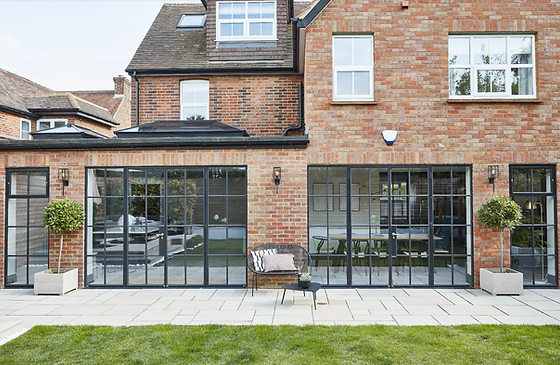
English Living
Britain, Scotland, Wales & Northern Ireland
Homes, Interiors & More
english-living.com
UK Home News
New build or conversion – how much VAT should you pay?
The VATman advises...

Andrew Jones, the VATman, specialises in supporting people throughout the UK who want to reclaim the VAT from their new build or conversion. As he explained on The Self Builders’ Podcast, produced by family-run, self-building finance specialists, Mayflower Mortgage and Finance, people can potentially be confused by what they can claim for new builds and conversions, particularly for buildings such as barns. His tips can be found below.
Both the Mayflower Mortgage and Finance team and Andrew Jones the VATman will at our client's Homebuilding & Renovating Show, 16-17 November, Bath and West Showground.
How should people use your services?
Ideally, we should be having a chat at the outset when you know how you're going to get your project built. Once you've got a plan in mind, that plan will dictate how the VAT is going to work, and you need to know your best route to make sure that you don't make a mistake and that it doesn't cost you any money. I'm quite happy to speak to someone several times during a build. My mindset is sharing knowledge costs nothing. There are lots of pitfalls which can end up costing you money.
Is a barn conversion VAT exempt?
With a barn conversion where you're creating a new dwelling, the final outcome is zero VAT. On a new build any contractor coming on site to do work for you should not be charging you VAT in the first instance. So, if the plumber comes along and does the job for you for ten thousand pounds, that is ten thousand pounds VAT free. But if you are purchasing items such as windows or doors yourself, you would pay VAT to the suppliers and then that is where you may need to reclaim some VAT on a new build.
On a conversion you get charged 5% VAT by your contractors. Then, exactly the same as in the new build example, when you make purchases at your local builders' merchants you pay 20% VAT. The difference here is that you reclaim the full 5% that you paid your contractor and you also claim the full 20% that you've paid at your suppliers. So again, the final outcome is zero VAT but you got there by a different route.
One other thing I’d mention, there is only one route to market, you are either a conversion or a new build. Where people are converting say a chapel, a church or maybe extending a barn, some will say to me ‘I’m doing a new build conversion’. But there is no such thing, you can’t have half and half, it’s either one or the other and usually that kind of work is classed as a conversion.

So, when is work on a barn classed as a conversion or a new build?
We'll see barn conversions that specifically state they are barn conversions on the planning permission because the existing structure stays secured. But then we'll see others which will involve knocking down and building a new dwelling. It has to be one or the other and nine times out of ten the work qualifies as a conversion.
What about renovations to a residential dwelling?
There are two schemes available. If you've got a dwelling that's been empty for two or more years, but less than 10 years, a contractor coming to site can charge the reduced rate of VAT of 5% for his work. And that applies to the labour and any materials that he brings and uses. This is not a claim back, instead you pay a reduced rate of VAT. So, if you're a DIY enthusiast and doing a lot yourself, there's very little in that two-year ruling for you, because it is purely what's deemed contractor-led.
The other scheme is if a house has been empty for 10 years or more then it qualifies as a conversion as in my earlier answer.
How many claims can you make on your VAT?
You can only make the one claim per dwelling on your VAT but it's not a one-off opportunity if you become a serial self-builder. For example, you start off building an end terrace in your garden. Then four years later, you sell the end terrace, and you buy a plot and build a bungalow. And then four years on, you sell the bungalow and you build a five-bed house. You can still claim each time but only once on each property. So, if you cash in your claim early, the money spent on the remainder of that dwelling cannot be refunded later.
Another of the dangers is where somebody wants to move their mortgage but technically their part-built house is not mortgageable for certain lenders. However, if you get a building control completion certificate, that opens doors for lenders as the house now qualifies as a dwelling.

Adobe
When somebody gets a building control completion certificate, there is a strict six-month time frame to get that claim into HMRC. I've had a little spurt recently of people presenting me with their documents and their completion certificate from a year to 18 months ago. And I have to tell them that they’ve missed the boat. They may say that the house wasn't finished but it was finished in the eyes of building control which also then means it's finished in the eyes of HMRC.
However, there are opportunities other than a building control completion certificate to cash in your VAT.
In England and Wales, we have what’s called the Valuation Office that puts your property into bands for council tax. The Valuation Office will then send you a letter to mark that new entry in the valuation list. Scotland & Northen Ireland have their own versions of this. So, there are opportunities to cash it in early, but the negative is that you start paying council tax earlier than you may want to and the money you spend after that point cannot be reclaimed.
Sometimes when building control visit your property, they notice an issue and they won't sign off on your home. In that case you may be able to get your building control officer to write a letter stating that the house is habitable and fit for purpose but not yet able to be signed off for a specific reason. As long this document as in the form of a letter it can be sent to you as a pdf on council or private company letterhead, dated and signed by your building control officer or a superior. HMRC also accept that as completion evidence but again only within six months of the date of that letter.
Both the Mayflower Mortgage and Finance team and Andrew Jones the VATman will at the Homebuilding & Renovating Show, 16-17 November, Bath and West Showground. To find out more about self-build finance, development finance and bridging finance as well as Mayflower Mortgage’s self-build savers’ solution, visit their website
Self Builders Savers Solution — mayflowermortgage.
Free reader tickets to the Homebuilding & Renovating show can be found here: https://www.homebuildingshow.co.uk/pr-general-outlets
